#tell us - Anti-Bullying

Anti-Bullying at Sir James Smith’s School
At Sir James Smith’s School we are creating an inclusive culture, that leads to students feeling safe, secure and learning in a happy environment which promotes individual wellbeing and positive behaviours.
We are a ‘telling school’ where students are able to report concerns and feel heard by staff.
Zero Tolerance
At Sir James Smith’s we adopt a zero tolerance approach to bullying and will react quickly to any reports we receive.
Students are regularly reminded of the need to report bullying of any kind to an adult or through any of the numerous ways listed below. Students will also have been told of the distinction between bullying and conflict between friendship groups.
Students are encouraged to report their concerns to a teacher, their Tutor, Year Team Leader or a trusted adult. They can also use our dedicated email address tellus@sirjamessmiths.cornwall.sch.uk , which is monitored throughout the day.
We employ a range of tried and tested anti-bullying strategies including:
Year Team Leaders/Pastoral Support
Our dedicated team are there to listen, advise and act on any reports of bullying swiftly. Liaising with parents of those bullying others and those feeling bullied.
CCTV
Our site is widely covered by CCTV which supports us in identifying issues and keeping students safe.
Wellbeing support
Students that are the victims of bullying can be offered wellbeing support in many forms. These can be internal support groups such as our peer mentoring team or referrals to external agencies.
Break, lunchtime, before and after school supervision
Staff in high visibility jackets on duty at all social times are available to deal with any issues that are reported to them.
Year specific break areas
Some students find it more reassuring to spend their breaktimes with students of their own age, each year group has designated indoor seating area and an outdoor covered area where they can spend their breaktimes.
Assemblies
We deliver student led drama anti-bullying assemblies, in which the key message is to have the courage to speak up. Pupils are told that if it is not reported then it cannot be dealt with.
Dedicated e-mail address
Students can use our dedicated anti-bullying e-mail address for students to report any incident. The address is: tellus@sirjamessmiths.cornwall.sch.uk
Poster Campaign
Around our school you will find a variety of thought-provoking posters aimed at encouraging students to think about how their words and actions can be perceived by others.
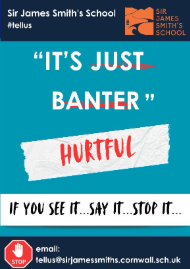
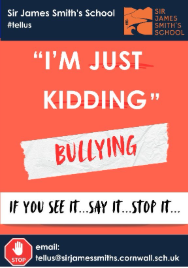
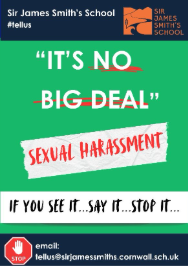
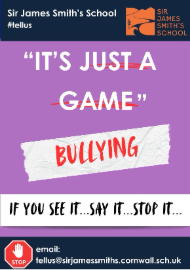
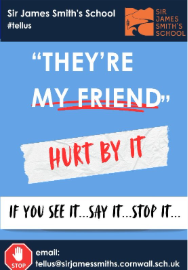
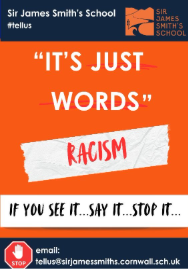
We firmly believe that the systems that are in place are robust and effective. However, all rely on the school being informed of a situation occurring. Students in all instances are encouraged to tell someone if they are experiencing bullying.
What is bullying?
Bullying is the repetitive, intentional hurting of one person or group by another person or group, where the relationship involves an imbalance of power. It can happen face to face or online.
If you are being bullied in any way or are worried about somebody else who might be you must tell somebody. As a school we take bullying very seriously. Students and parents should be assured that they will be supported when bullying is reported.
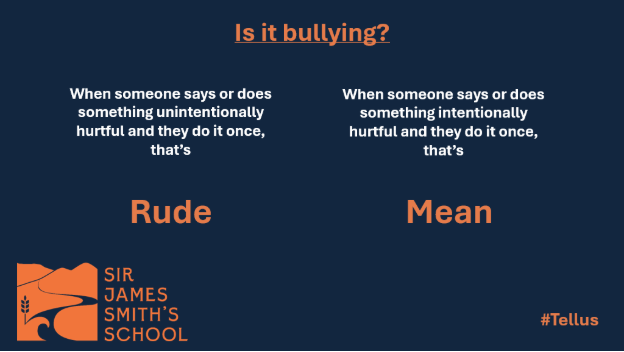
Types of bullying behaviour
-
Physical – pushing, poking, kicking, hitting, biting, taking someone’s belongings.
-
Verbal – name calling, sarcasm, spreading rumours, threats, teasing, belittling, racist or sexist comments.
-
Emotional – isolating others, tormenting, hiding books, threatening gestures, ridicule, humiliation, intimidating, excluding, manipulation and coercion, tormenting, graffiti.
-
Sexual – unwanted physical contact, inappropriate touching, abusive comments, homophobic abuse, exposure to inappropriate films, comments relating to sex or sexuality.
-
Online/cyber – posting on social media, sharing photos, sending nasty text messages, social exclusion.
-
Indirect – Can include the exploitation of individuals, spreading rumours, sending abusive texts, excluding somebody from a group.
Many of these types of bullying can take place in the online environment and this is known as “online abuse” eg. misuse of all areas of the Internet, inappropriate messaging and emailing, sending offensive or degrading images by phone or via the Internet, misuse of any social media.
If there are any serious offences reported this information may be given to other agencies to assist in helping you with your problem. For advice on cyberbullying go to the following
website: http://ceop.police.uk/
Reporting Bullying
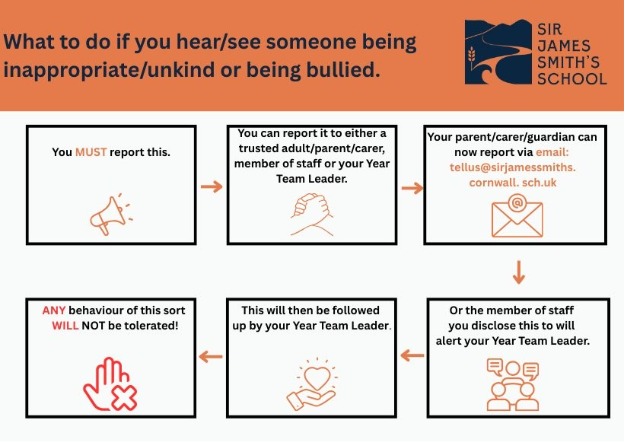

Additional support/useful links from the Anti-Bullying Alliance:
Helplines
-
ChildLine: ChildLine is the UK's free, confidential helpline for children and young people. They offer advice and support, by phone and online, 24 hours a day. Call 0800 1111. They have a designated page for bullying issues that includes a new video about building up your confidence after bullying.
-
Direct Gov: Information for young people on cyberbullying, bullying on social networks, Internet and email bullying, bullying on mobile phones, bullying at school, what to do about bullying, and information and advice for people who are bullying others and want to stop.
-
EACH: EACH has a freephone Helpline for children experiencing homophobic, biphobic or transphobic bullying or harassment: 0808 1000 143. It’s open Monday to Friday 10am-5pm.
-
Victim Support: They offer support to young people affected by crime. Their Children and Young People's (CYP) Service also deals with cases of bullying; offering advice and working with professionals to ensure young people get the support they need. You can call their Supportline for free on 08 08 16 89 111.
Websites
-
The Child Exploitation and Online Protection Centre (CEOP) is linked to staying safe online: CEOP Safety Centre
-
Childline: information about bullying
-
Kidscape: information for young people
Reporting cyber-bullying
-
If someone makes you feel uncomfortable or upset online, talk to an adult you can trust, such as a relative or a teacher. If you would prefer to talk to someone in confidence you can contact Childline (0800 1111)
-
If someone has acted inappropriately online towards you, or someone you know, you can report directly to the Child Exploitation and Online Protection Centre (CEOP). It could be sexual or threatening chat, or being asked to do something that makes you feel uncomfortable or someone asking to meet up.


